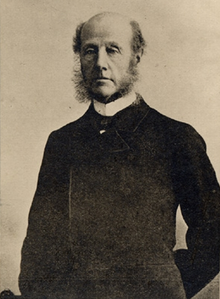User:Connormah/Francis Godschall Johnson

Sir Francis Godschall Johnson (January 1, 1817 – May 27, 1894) was a Canadian office holder. He was appointed Lieutenant-Governor of Manitoba on April 9, 1872, but had his commission revoked before he was officially sworn in.
Early life and education
[edit]Francis Godschall Johnson was born on January 1, 1817 at Oakley House in Bedfordshire, England, one of the 13 children of Godschall and Lucy (née Bisshop) Johnson.[1] His father was Captain of the 10th Royal Hussars, and later served as Great Britain's Consul-General in Belgium.[1] He was educated at Harrow School in London, along with attending schools in Belgium and France, where he became fluent in French.[2] He continued his education after immigrating to Montreal, Lower Canada in the early 1830s, studying law. He was called to the Bar of Lower Canada in 1839.[2] He became good friends with Prime Minister John A. Macdonald and Sir George-Etienne Cartier.[2]
Career
[edit]Johnson served as a translator and clerk for prisoners following rioting in Lower Canada, while still a law student in 1837.[3] He formed a partnership in 1839 with Charles Dewey Day, a Montreal laywer, and later with Alexander Buchanan, which lasted until 1845.[3]
Johnson moved to Montreal in the 1830s, where he studied law. He was called to the bar in 1839, and became known as a leading figure in criminal law. His career was undoubtedly helped by his bilingualism. On February 11, 1848, he was appointed a Q.C.
Politically, Johnson was a Conservative. He was elected a Vice-President of the British American League in 1849, and opposed the Rebellion Losses Bill later in the same year. He also signed the Annexation Manifesto, for which he was stripped of his Q.C. (which was not restored until 1853).
Legal career
[edit]In 1854, Johnson was commissioned by the Hudson's Bay Company to work as a legal administrator in Assiniboia. He was soon recognized as one of the most competent figures in the Company, and became Assistant Governor of Assiniboia on July 19, 1855. On November 26, he succeeded William Bletterman Caldwell as Governor, also retaining his legal portfolio. He appears to have been popular and respected during his time in the territory.
Johnson returned to Montreal in 1858, and resumed his legal practice. He was appointed a judge in 1865.
In 1870, he was commissioned by George-Étienne Cartier to become the first legal recorder in the new province of Manitoba. He was sworn in on October 19, and sought to develop a functioning legal system in the province.
Political career
[edit]On October 21, 1870 Lieutenant Governor Adams George Archibald appointed Francis as a Legislative Councillor in Rupert's Land and the Northwest Territories. This appointment made him the first Councillor and member of the Executive Council in the territory. The appointment to the Temporary North-West Council was quickly revoked by the federal government, however, which ruled that Archibald had overstepped his authority in granting it.
On April 9, 1872, Johnson reluctantly agreed to replace Archibald as Lieutenant Governor of the province. This appointment was also revoked, following opposition in the Canadian House of Commons to a government appointee holding two paid positions. Johnson was never sworn into office, despite his continued popularity in the region.
Judicial career
[edit]Johnson returned to Montreal later in 1872, and was appointed a judge of the Superior Court. On December 9, 1889, he was appointed its Chief Justice.
References
[edit]Bibliography
[edit]- Perry, Sandra E.; Powell, Karen L. (2006). On Behalf of the Crown : Lieutenant Governors of the North-West Territories and Alberta, 1869-2005. Edmonton, Alberta: Legislative Assembly of Alberta. ISBN 0-9689217-4-4.
